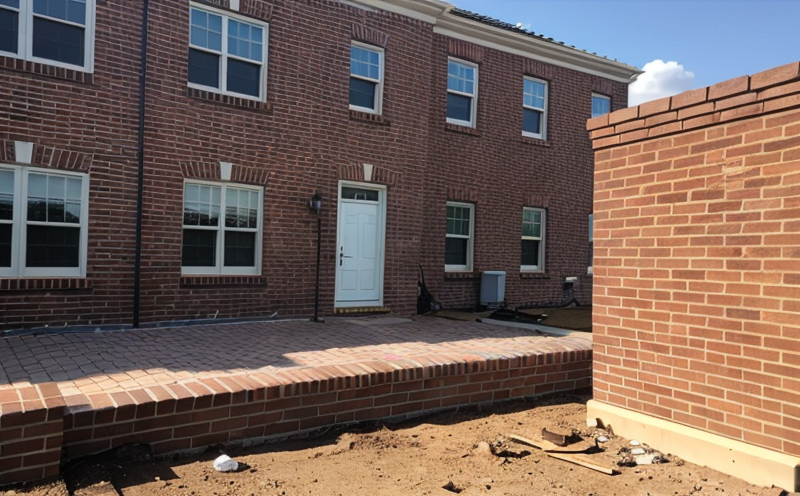ASTM C109 Compressive Strength of Mortar Cubes
The ASTM C109 Standard Test Method for Compressive Strength of Hydraulic-Cementing Mortars Using 4-Inch Cube Specimens is a widely recognized procedure used by the construction industry to measure the compressive strength of mortar. This test method is crucial in ensuring that the mortar used in building and infrastructure projects meets the required standards for durability, integrity, and safety.
The ASTM C109 standard applies specifically to mortars intended for use within the construction sector where their compressive properties are critical. These mortars often find application in concrete masonry units (CMUs), bricklaying, structural repairs, and other areas requiring robust mortar performance.
The test involves preparing cube specimens from a mixture of cement, water, and aggregates according to specified proportions. The cubes are then cured under controlled conditions before being subjected to compressive load until failure occurs. The maximum load at which the specimen fails determines its compressive strength.
Testing per ASTM C109 is essential for several reasons:
- To ensure compliance with design specifications and codes.
- To verify that the mortar has achieved adequate strength to support construction loads.
- To monitor quality control throughout production processes.
The test results are vital inputs for structural engineers, architects, and project managers who rely on accurate data when specifying materials or approving designs.
For a detailed understanding of how this method impacts the building and infrastructure sectors, consider its role in ensuring safety and longevity of structures like bridges, buildings, and retaining walls. The reliability offered by ASTM C109 tests is critical for long-term performance expectations.
The test procedure outlined in ASTM C109 can be summarized as follows:
- Proportioning the cementitious material with sand or fine aggregates to form a mortar mix.
- Casting cubes using this mixture and curing them under specified conditions.
- Applying progressively increasing loads until failure occurs, recording the maximum load before failure.
The outcome of these tests provides critical information for various stakeholders involved in construction projects. Compliance with ASTM C109 ensures consistent quality across different batches of mortar, which is essential for maintaining project integrity and safety standards.
Understanding the significance of this test method can help decision-makers prioritize testing protocols that align with industry best practices. By adhering to these guidelines, professionals contribute significantly towards enhancing overall construction quality and reliability.
Scope and Methodology
| Test Procedure | Description |
|---|---|
| Specimen Preparation | Cubes are cast using a mixture of cement, fine aggregates, and water. The ratio is typically 1:3. |
| Curing Conditions | The specimens must be cured at temperatures between 70°F to 95°F (21°C to 35°C) for one day, followed by seven days at the same temperature range without exposure to rain or other moisture sources. |
| Compressive Testing | The specimens are placed in compression testing machines and loaded until failure occurs. The machine records the maximum load applied before failure. |
The ASTM C109 procedure is designed to provide accurate measurements of compressive strength that can be used for quality assurance purposes. It helps ensure consistency across different batches of mortar, thereby enhancing project reliability and safety standards.
Understanding these nuances allows professionals to make informed decisions about material choices and process improvements. By adhering strictly to ASTM C109 specifications during testing, organizations demonstrate their commitment to maintaining high-quality construction practices.
Eurolab Advantages
At Eurolab, our expertise in ASTM C109 testing sets us apart as a leading provider of quality assurance services for the building and infrastructure sectors. Our team comprises experienced technicians who are well-versed in all aspects of mortar compressive strength testing.
- We offer state-of-the-art equipment calibrated to meet the highest industry standards.
- Our laboratories adhere strictly to ASTM C109 guidelines, ensuring accurate and reliable test results.
- Eurolab provides quick turnaround times without compromising on accuracy or precision.
In addition to our technical capabilities, Eurolab also offers comprehensive support services that include:
- Consultation with clients regarding material selection and testing strategies.
- Training programs for staff wishing to enhance their knowledge of ASTM C109 methods.
- A commitment to continuous improvement through participation in ongoing research initiatives related to mortar performance.
Our goal is to help our clients achieve their quality objectives by providing precise, reproducible results that reflect real-world conditions. By leveraging Eurolab’s experience and resources, you can be confident that your testing needs will receive top-notch attention.
Environmental and Sustainability Contributions
- Sustainable Materials: Ensuring the quality of mortars used in construction projects supports sustainable building practices by promoting durability and longevity. This reduces the need for frequent replacements, thereby lowering environmental impact.
- Energy Efficiency: Stronger mortar contributes to more efficient structures, which can lead to better insulation properties and reduced energy consumption over time.
The use of ASTM C109-compliant mortars not only enhances structural integrity but also aligns with broader sustainability goals. By investing in quality assurance measures like those provided by Eurolab, organizations demonstrate their commitment to environmentally responsible practices.





